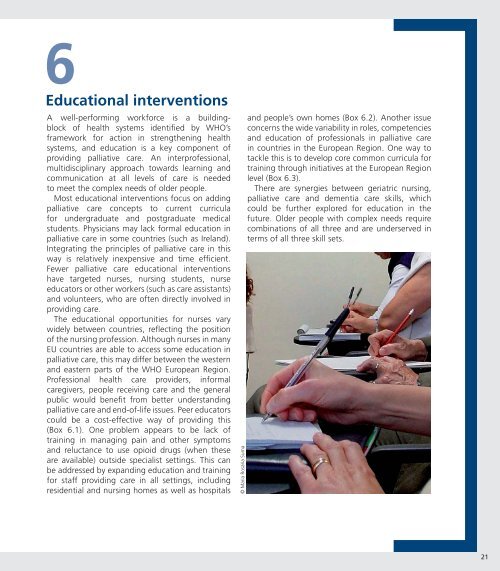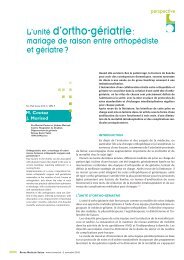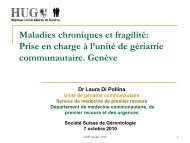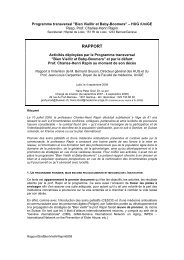Palliative care for older people - World Health Organization ...
Palliative care for older people - World Health Organization ...
Palliative care for older people - World Health Organization ...
You also want an ePaper? Increase the reach of your titles
YUMPU automatically turns print PDFs into web optimized ePapers that Google loves.
6Educational interventionsA well-per<strong>for</strong>ming work<strong>for</strong>ce is a buildingblockof health systems identified by WHO’sframework <strong>for</strong> action in strengthening healthsystems, and education is a key component ofproviding palliative <strong>care</strong>. An interprofessional,multidisciplinary approach towards learning andcommunication at all levels of <strong>care</strong> is neededto meet the complex needs of <strong>older</strong> <strong>people</strong>.Most educational interventions focus on addingpalliative <strong>care</strong> concepts to current curricula<strong>for</strong> undergraduate and postgraduate medicalstudents. Physicians may lack <strong>for</strong>mal education inpalliative <strong>care</strong> in some countries (such as Ireland).Integrating the principles of palliative <strong>care</strong> in thisway is relatively inexpensive and time efficient.Fewer palliative <strong>care</strong> educational interventionshave targeted nurses, nursing students, nurseeducators or other workers (such as <strong>care</strong> assistants)and volunteers, who are often directly involved inproviding <strong>care</strong>.The educational opportunities <strong>for</strong> nurses varywidely between countries, reflecting the positionof the nursing profession. Although nurses in manyEU countries are able to access some education inpalliative <strong>care</strong>, this may differ between the westernand eastern parts of the WHO European Region.Professional health <strong>care</strong> providers, in<strong>for</strong>mal<strong>care</strong>givers, <strong>people</strong> receiving <strong>care</strong> and the generalpublic would benefit from better understandingpalliative <strong>care</strong> and end-of-life issues. Peer educatorscould be a cost-effective way of providing this(Box 6.1). One problem appears to be lack oftraining in managing pain and other symptomsand reluctance to use opioid drugs (when theseare available) outside specialist settings. This canbe addressed by expanding education and training<strong>for</strong> staff providing <strong>care</strong> in all settings, includingresidential and nursing homes as well as hospitals© Maria Rosaria Sumaand <strong>people</strong>’s own homes (Box 6.2). Another issueconcerns the wide variability in roles, competenciesand education of professionals in palliative <strong>care</strong>in countries in the European Region. One way totackle this is to develop core common curricula <strong>for</strong>training through initiatives at the European Regionlevel (Box 6.3).There are synergies between geriatric nursing,palliative <strong>care</strong> and dementia <strong>care</strong> skills, whichcould be further explored <strong>for</strong> education in thefuture. Older <strong>people</strong> with complex needs requirecombinations of all three and are underserved interms of all three skill sets.21
















